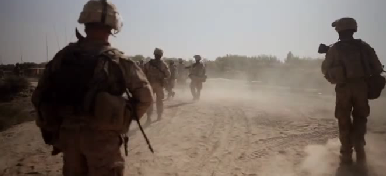One Man's (Subjective) Experience

As Dennis watched the members of Echo Company step off the buses, he noticed that Nathan Harris, the sergeant who had given him water on the first day of the assault in Helmand, was missing. Dennis learned that Harris had been hit by machine-gun fire and badly wounded two weeks earlier. He tracked down Harris, who had just been released from a naval hospital in Norfolk, Virginia after multiple surgeries.
At their meeting, the decision about what direction to take the story became clear, says Dennis: tell Harris’ story. He had gotten to know Harris in Afghanistan. The two men had shared a powerful experience—surviving a frontal attack—and trusted each other. Dennis was confident that focusing on Harris would be compelling. He says:
I knew I had to follow him. I knew that this was the course that the story would go. That decision was very clear, but how it unfolded after that, and how it would combine with my existing footage and with that existing story, was much less clear.
The decision to follow one person took the film in a new direction. Instead of being about combat in Afghanistan from the perspective of soldiers on the front line, it became the story of one person’s war, return and recovery. Dennis realized that the recovery process was integral to the experience of going to war, and that coming home could be just as difficult as combat itself if not harder. “You have relationships, you have bills. All of that can seem far more overwhelming than your daily combat patrols,“ says Dennis. ”[It was this] very psychological experience of coming home from war, of coming from this world of life and death back to one where it seems like most people are just shopping.” The disconnect could be profound.
Harris proved wonderfully cooperative. “He let me in in, I think, a way that he wouldn’t have let anyone else in,” says Dennis. He invited Dennis home to Yadkinville, North Carolina, and introduced him to his wife, Ashley, his friends, and family by saying “this guy was out there with me.” Recalls Dennis:
With that, I was accepted into this rural Baptist community, and essentially lived with Nathan and Ashley during his recovery and transition back into a society that had very little understanding of what he’d been through.
Over the next nine months, Dennis traveled back and forth between London and North Carolina, staying at Harris’ home for weeks at a time. He immersed himself in the lives of a couple in a small town and the experience of a badly wounded soldier struggling to recover and reintegrate himself into civilian life. Harris’ life at that point was dominated by medical care, addictive painkillers and anger. It was a new type of filming experience for Dennis. Instead of combat, it was a couple's bickering. Instead of fields and villages in Afghanistan, it was a car in a fast food drive-through lane and a couple's bedroom as they lay sleeping.
Funding . By January 2010, Roast Beef Production was able to secure funding from several sources, including Britdoc Foundation, a documentary film funder associated with Britain’s Channel 4, and Impact Partners, a New York-based investment fund that financed documentaries on social issues. This allowed Dennis to look for an experienced film editor. He knew he would need help to tease out a story, weave the right pieces of footage together, and craft a documentary.